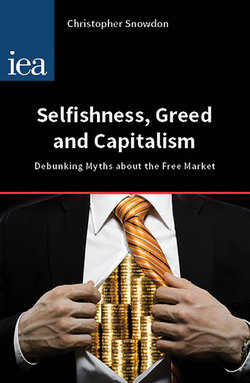Читать книгу Selfishness, Greed and Capitalism - Christopher Snowdon - Страница 18
На сайте Литреса книга снята с продажи.
Conclusion
ОглавлениеThere is no assumption in mainstream economics that people are perfectly rational and it is quite absurd to suggest that ‘neoliberal economists assume that human beings when engaging in the market place are omniscient: they can clairvoyantly foretell everything that might happen and how likely it is to occur and when’ (Murphy 2011: 37).
Economists do not see a world populated by totally irrational voters, wholly self-serving politicians and perfectly informed consumers. Selfishness, ignorance, altruism and reason are fairly evenly distributed among the population. A fool in a polling booth does not become a sage in a shopping centre and a corrupt politician does not become Francis of Assisi when he sets up a small business. The extent to which we seek out information and behave rationally depends on the incentives we are given and the costs of acting foolishly. As voters, the cost of irrationality and ignorance is practically zero. As agents in the market, the cost is much greater and we respond accordingly. ‘Assuming that all people are fully rational all the time is bad economics,’ writes Caplan (2007: 135). ‘It makes more sense to assume that people tailor their degree of rationality to the costs of error.’
Free-market economists do not assume that individuals always know what is best for them, but they do assume that individuals are better placed to know their own preferences than a distant bureaucrat. So long as we bear the consequences of our actions, the path of progress is better trod by sovereign beings pursuing their goals through voluntary cooperation than by a technocratic elite prodding us all in the same direction.
